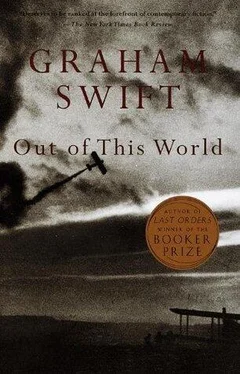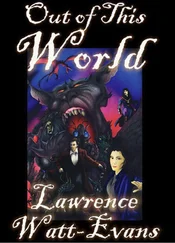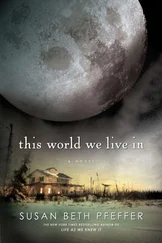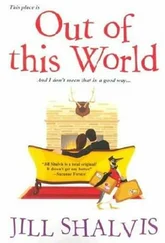Graham Swift - Out of This World
Здесь есть возможность читать онлайн «Graham Swift - Out of This World» весь текст электронной книги совершенно бесплатно (целиком полную версию без сокращений). В некоторых случаях можно слушать аудио, скачать через торрент в формате fb2 и присутствует краткое содержание. Год выпуска: 2012, Издательство: Vintage, Жанр: Современная проза, на английском языке. Описание произведения, (предисловие) а так же отзывы посетителей доступны на портале библиотеки ЛибКат.
- Название:Out of This World
- Автор:
- Издательство:Vintage
- Жанр:
- Год:2012
- ISBN:нет данных
- Рейтинг книги:3 / 5. Голосов: 1
-
Избранное:Добавить в избранное
- Отзывы:
-
Ваша оценка:
- 60
- 1
- 2
- 3
- 4
- 5
Out of This World: краткое содержание, описание и аннотация
Предлагаем к чтению аннотацию, описание, краткое содержание или предисловие (зависит от того, что написал сам автор книги «Out of This World»). Если вы не нашли необходимую информацию о книге — напишите в комментариях, мы постараемся отыскать её.
Out of This World — читать онлайн бесплатно полную книгу (весь текст) целиком
Ниже представлен текст книги, разбитый по страницам. Система сохранения места последней прочитанной страницы, позволяет с удобством читать онлайн бесплатно книгу «Out of This World», без необходимости каждый раз заново искать на чём Вы остановились. Поставьте закладку, и сможете в любой момент перейти на страницу, на которой закончили чтение.
Интервал:
Закладка:
They’d come in submarines. Or they’d come dropping out of the sky on thousands of parachutes. They had the finest navy and army in the world and would make short work of it. The British were a peace-loving people who cherished fairness and freedom, but, like the ancient Athenians, they understood the value of military strength to preserve those very things. The British were the most civilized nation on earth. That was why they had ruled half of it. They were so civilized that they studied and revered our ancient past, while we let our temples crumble and destroyed ourselves with our eternal bickering and ignorance.
What did I do in the war? I was lucky, amazingly lucky. I held on to my luck. First there was a German garrison, then the Bulgars. If there had been a choice, we would have chosen the Germans. Some things I never told you, Harry, you learn to wipe them out. I stayed a virgin. At an age when I knew I was becoming beautiful, I learnt to make myself look ugly. At an age when I knew I was growing up, I learnt to turn myself into a perpetual, stunted child — Uncle’s little niece whom no one dare touch. I wasn’t raped or sent to the brothels in Kavalla. We weren’t made homeless. Uncle Spiro wasn’t mutilated or shipped off to a labour camp.
But I knew that if they searched the villa and found even that small handful of English books that he brought with him from Salonika, they could decide to shoot us. Shoot us, like they shot the three men who hung one evening, heads down, from the plane tree in the village square. They had been shot many times. You could see that. And three the next evening, and three the evening after that.
I used to think if I took the books and burnt them or bundled them up and threw them in the sea, then perhaps I would be saving our lives. But then if I threw them away I would be throwing away the one thing that made those months after months on that island endurable, which gave them some thin, vicarious purpose. And, again, if I threw them away, perhaps we would only deserve it if the British never came.
But they did come. In the autumn of ’44. The Germans and the Bulgars departed. So then it was all right for the Greeks to fight each other …
I said I didn’t want to leave him. I would soon be back. Before the winter. But I think he knew, as we stood on that railway platform, that I wouldn’t return. One English watchword he could never convert into reality was ‘stiff upper lip’. He was a Greek. His face contorted. His eyes streamed with farewell emotion. And I saw how when I was gone he would start to think, achingly, of how glad and proud he’d been looking after me, my gallant guardian, in what, now it was over, now new troubles were coming, might start to seem again like Paradise.
Yet it was I who, just as much — more — had looked after him. And he saw that too. I was twenty-one. I didn’t want to become a nurse.
He was just fifty-three then. Though he looked older. His career of scholarship had been brought to a halt in what should have been its prime years, and, now, there was little chance of his picking up again the pieces of his former life.
Pneumonia? Or a broken heart?
The station hall was full of slogans and posters. People clutching all they possessed.
Of course, he didn’t know that my journey would take me, eventually, to England. So as compensation for having lost me he would have the knowledge that I had settled in the land of his dreams — as if all that training he had given me in the war had borne fruit. His niece — an Englishwoman! That I would write him letters like the fulfilment of wishes — he is even called Harry (‘God for Harry!..’); there is this house in Surrey — yet which remained strangely vague about what my husband did (a ‘journalist’) or what my father-in-law did, and never mentioned, before the letters got less frequent and finally stopped altogether, what must have been obvious to both of us, especially given what was happening in Greece — that he might have come to England too. Perhaps he would not dare suggest it, till I did. Perhaps he had become disaffected with the British now they were, in reality, the arbitrators of Greece. Or perhaps he had come to feel, as prematurely old men may feel, that this was his country, he was born in it, and he would die in it, even though it was a mess.
They were still fighting when Sophie was born. I used to skip the reports in the English papers. And to think you very nearly went out there — to take photographs!
But I think he knew. I think he saw it all, unblurred by those farewell tears. More than one kind of desertion.
More than one kind of desertion. Dear Harry. If it hadn’t been for that sudden telegram, you might never have known at all — my confession spilling out with my own farewell (farewell!) tears. Because we’d made up our minds. I would get rid of it. Go to someone. While you were away. Then we’d stop. And say nothing. Before two homes got broken.
In the plane to Athens I thought, I want this journey never to stop. I want to stay up here for ever. I have nowhere to go. No home. No one to forgive me. When we landed, there wasn’t even any of that famous Greek sunshine. It was raining. The custodial faces of King Paul and Marshal Papagos looked down at me in the arrival hall. I was suddenly shocked to be where I was. To be speaking my own language to my own people. Shocked by the beggars and touts, the jumble and disrepair of the streets and all the signs of a country crawling out from a decade of misery. In England it was Coronation year, and Frank had said the best was yet to come. Shocked to be in the capital city of the land of my birth, where I had never been before and where I felt a total stranger. Shocked by the sudden sight of the Parthenon, bony white against the grey sky, as if I had never expected it would be there. I booked into a hotel for the night and thought of that girl arriving in Nuremberg. It was all like a reproof. I thought: I should get rid of it here, somehow, here in this country. I phoned the hospital in Salonika and they said there was little time. It was still raining the next morning when I took the plane north. The sky was dark with clouds and I thought: Even the gods are angry.
Sophie
Brooklyn. ‘Broken Land’. Somebody told me, Doctor K, that’s just what it means.
Every so often I still go up to the Heights, above the Expressway, just to look at that mirage of Manhattan across the water. The views in this place still knock me out, even though I’m no longer a goggle-eyed Limey. They still give me a kick. And do you know what’s so great about them? It’s that they’re absolutely man-made, they’re as man-made as you’re ever going to get. All steel and concrete and lights and lines and glass and electricity. But they aren’t human. That’s the big kick, that’s the come-on. It’s pure man-made, but it ain’t human. Oh sure, the humans are there , never so many of them, never so packed together, milling around under the towers like ants under lifted stones. But you have to get up real close before you see them, you have to get through all the glass and concrete superstructure before you feel their hot, below-decks breath. Or else it’s the other way round: you’re down there at people-level, amongst the voices and faces and the fogged-up windows and the smell of coffee and pizza, then you step out and say to yourself, Wow, I’d almost forgotten: there’s this edifice .
How many lives can you see at a glance in New York, without seeing a single life? Supposing every window were a life — a little bright box of life.
A man is six feet tall (okay, you’re not — but you can handle that) and the Citicorp building is nine hundred feet. There’s got to be something wrong there. Or else something splendid, something sublime.
Читать дальшеИнтервал:
Закладка:
Похожие книги на «Out of This World»
Представляем Вашему вниманию похожие книги на «Out of This World» списком для выбора. Мы отобрали схожую по названию и смыслу литературу в надежде предоставить читателям больше вариантов отыскать новые, интересные, ещё непрочитанные произведения.
Обсуждение, отзывы о книге «Out of This World» и просто собственные мнения читателей. Оставьте ваши комментарии, напишите, что Вы думаете о произведении, его смысле или главных героях. Укажите что конкретно понравилось, а что нет, и почему Вы так считаете.












